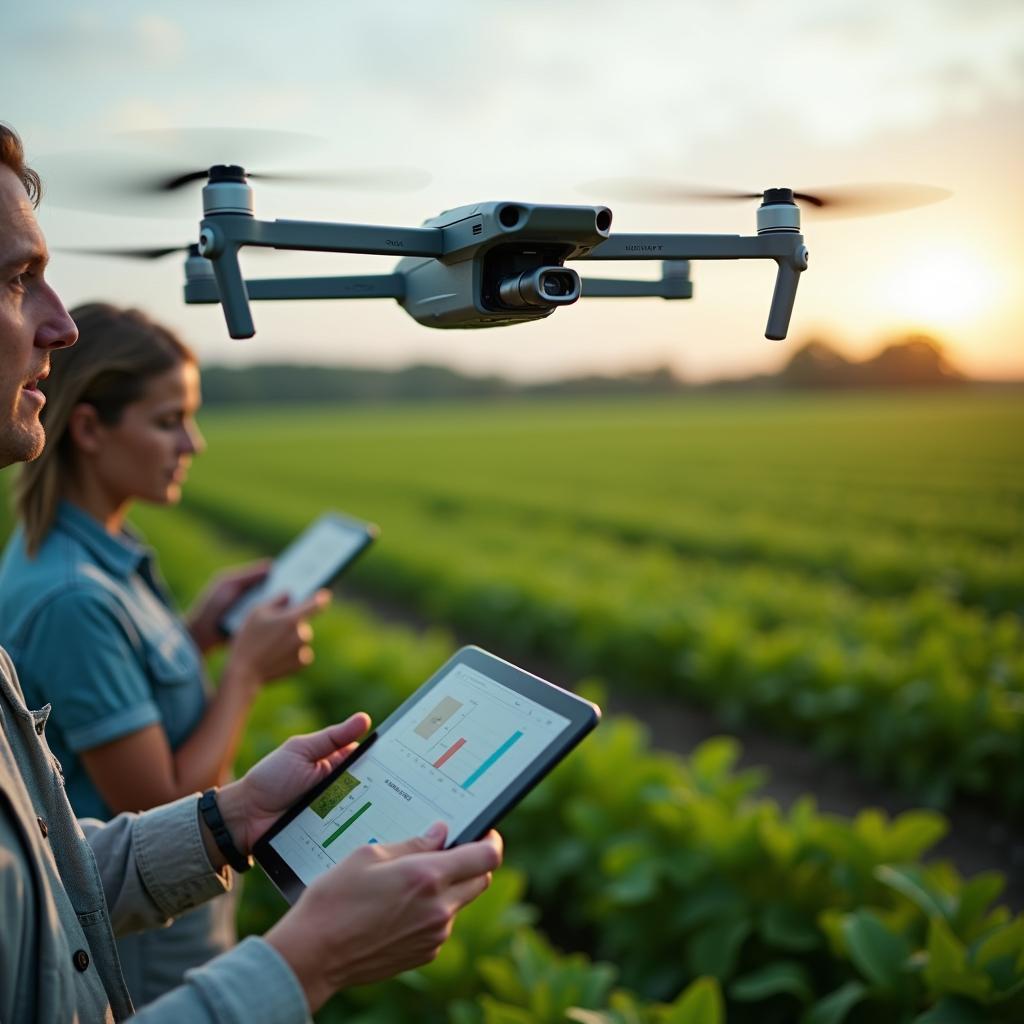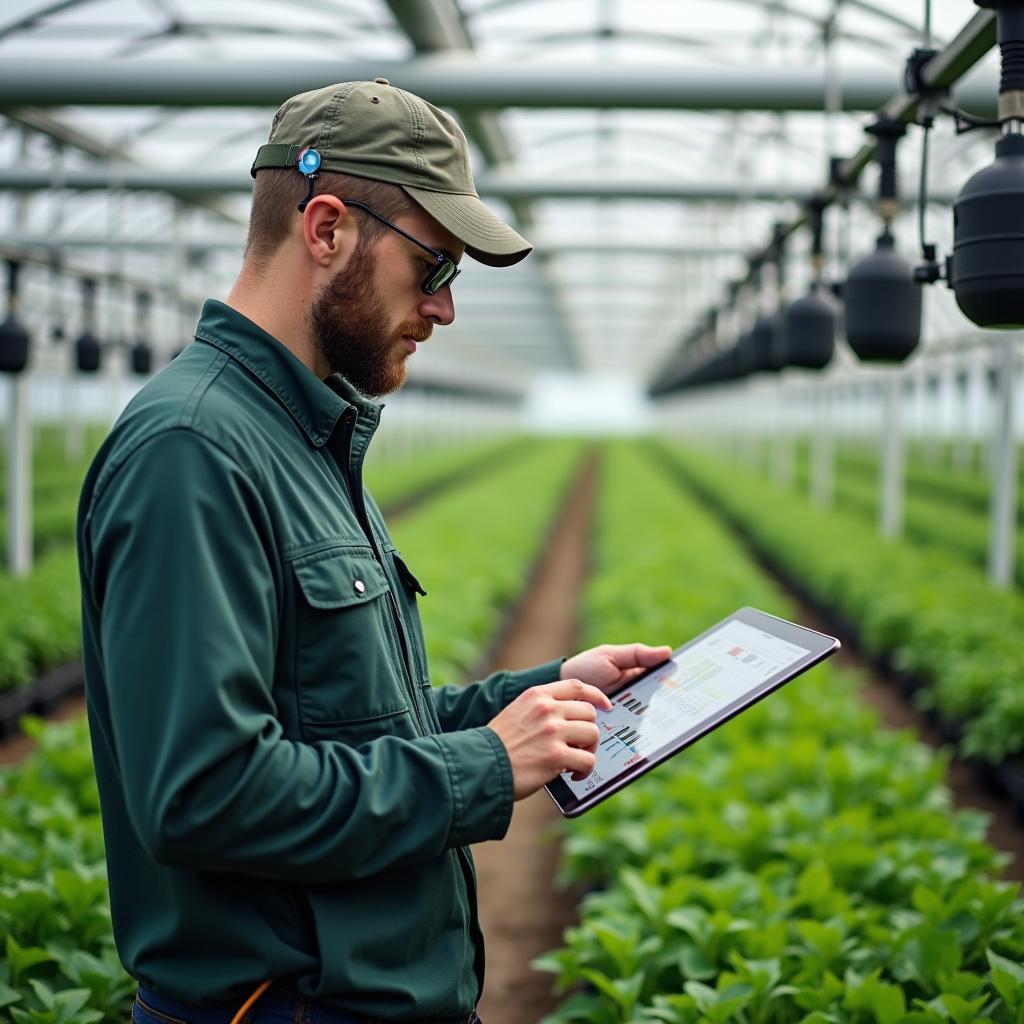The topic of technology’s impact on agriculture has become increasingly prevalent in IELTS Writing Task 2, appearing frequently in recent years. Based on analysis of past exam questions, this theme often intersects with environmental concerns, economic development, and food security. Let’s examine a recent question that exemplifies this trend.
Table Of Contents
Question Analysis
Some people believe that technological advancement in agriculture has brought more harm than benefits to farmers and the environment. To what extent do you agree or disagree with this statement?
This question requires candidates to evaluate the positive and negative impacts of agricultural technology, particularly focusing on farmers and environmental consequences. Let’s explore model answers across different band scores.
 Advanced agricultural technology showing drone monitoring vast cropland
Advanced agricultural technology showing drone monitoring vast cropland
Band 9 Model Answer (290 words)
While technological advancements in agriculture have raised some concerns, I strongly disagree with the statement that they have caused more harm than benefits to farmers and the environment.
Modern agricultural technology has revolutionized farming practices in numerous beneficial ways. Precision farming techniques, enabled by the role of technology in promoting sustainable agriculture, have dramatically reduced water wastage and optimized fertilizer usage. For instance, GPS-guided tractors and drone monitoring systems allow farmers to target resources precisely where needed, minimizing environmental impact while maximizing yield efficiency.
Furthermore, technological innovations have significantly improved farmers’ productivity and income. The impact of technology on global trade has enabled farmers to access wider markets and receive real-time pricing information, empowering them to make better business decisions. Modern storage facilities and processing technologies have reduced post-harvest losses, ensuring better returns on investment.
Regarding environmental protection, The role of technology in sustainable farming has introduced eco-friendly practices. Vertical farming and hydroponics systems have reduced land usage while increasing crop yields. Additionally, biotechnology has developed drought-resistant crops that require fewer pesticides, contributing to environmental conservation.
While some argue that technology has led to job losses in agriculture, how automation is changing the agricultural sector shows that it has actually created new specialized roles and opportunities for skilled agricultural workers. Moreover, these innovations have made farming more attractive to younger generations, ensuring the sector’s sustainability.
In conclusion, agricultural technology has predominantly delivered positive outcomes for both farmers and the environment, fostering sustainable practices while enhancing productivity and profitability.
 Farmer using digital tablet for crop management
Farmer using digital tablet for crop management
Key Vocabulary
- Precision farming (n) /prɪˈsɪʒən ˈfɑːmɪŋ/ – Using technology to optimize crop yields
- GPS-guided (adj) /dʒiːpiːˈɛs ˈɡaɪdɪd/ – Directed by satellite navigation
- Post-harvest (adj) /pəʊst ˈhɑːvɪst/ – After crop collection
- Hydroponics (n) /ˌhaɪdrəˈpɒnɪks/ – Soil-less growing method
- Biotechnology (n) /ˌbaɪəʊtɛkˈnɒlədʒi/ – Using biological processes in agriculture
Analysis of Band Scores
Band 9 Features:
- Sophisticated vocabulary and complex structures
- Clear position with well-developed arguments
- Coherent paragraphing with strong topic sentences
- Relevant examples and specific details
- Natural linking devices
Band 7 Common Errors:
- Less sophisticated vocabulary
- Simpler sentence structures
- Basic examples
- Limited range of linking devices
Band 6 Limitations:
- Repetitive vocabulary
- Grammar mistakes
- Unclear organization
- Limited development of ideas
Practice Suggestion
Try writing your own essay addressing this question: “How has digital technology transformed traditional farming methods in your country?” Share your essay in the comments for feedback and discussion.
Remember to maintain a formal academic tone and support your arguments with specific examples.


